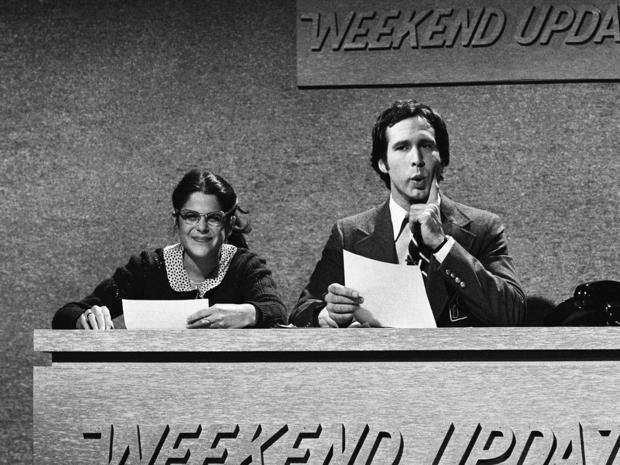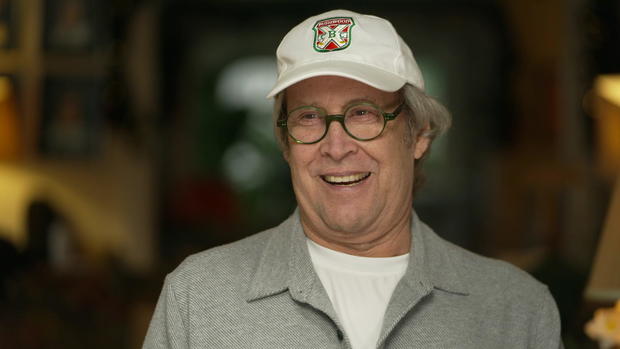▶ Watch Video: Chevy Chase, still deadpan
Judge Elihu Smails (Ted Knight): “I mean, he’s been club champion for three years running, and I’m no slouch myself.”
Ty Webb (Chevy Chase): “Don’t sell yourself short, judge. You’re a tremendous slouch!”
It was all right there in 1980, when Chevy Chase made “Caddyshack.” And it’s still here today, a year after a near-fatal heart failure.
Correspondent Jim Axelrod asked, “The heart thing was a year ago. How you feelin’?”
“Oh, we removed it. Didn’t need it. It’s much better now,” Chase replied.
His relentless deadpan. He’s funny, or caustic, even raunchy, as we got to see for ourselves during our conversation.
Axelrod asked, “Out of all those characters, which one is closest to you?”
“I think Fletch, because it was really was me,” he replied.
“What part of you was it?”
“My c***.”
It all still makes it hard to tell if Chase is “just joking.”
“What do you think of ‘Saturday Night Live’ now?” asked Axelrod.
“Stinks. No, I …”
“Wait a minute. I can’t tell if you’re joking or serious – “
“No, I’m not serious,” Chase said.
That wit was the foundation for one of the most successful comic acting careers over the last half-century. He was the first to say the words, “Live from New York, it’s ‘Saturday Night’!”
The first to anchor “Weekend Update” (“I’m Chevy Chase, and you’re not”) … and the fall-down breakout star from “Saturday Night Live”‘s first cast that included Dan Aykroyd, Gilda Radner and John Belushi (who seemed to have a special talent for getting under Chase’s skin).
Chase said, “I got a couple of photos, and in the background, there’s John like this (flipping the bird), and he didn’t do it just once. Anytime I could find a little peace, there’s John!”
If there was any resentment, it came as no surprise to Chase.
“Suddenly, you’re the guy on the cover of magazines,” said Axelrod. “You’re the first among equals?”
“Yeah.”
“Was that odd?”
“No. I felt pretty strongly that I was the funniest,” Chase laughed.
He could afford to laugh it off, when he left during “SNL”‘s second season. A string of movies was about to make Chase a Hollywood heavyweight: “Fletch,” the “National Lampoon’s Vacation” franchise, and “Three Amigos,” among others, did more than $1 billion at the box office during the 1980s.
“Oh, those wonderful movies,” Chase said. “Good God, that was my mark of success, getting into the movies and making them funny. I could really write my own stuff in movies and tell people where to go and whatnot.”
Telling people “where to go” seemed to be important to him then, and seems to still be now.
Axelrod asked, “Is that what you loved about him? Fletch was closest to you as a person?”
“Yeah, the attitude. I don’t know.”
“Smug?”
“I’m gettin’ too old to answer these things well.”
“Smug?”
“F*** you. I’m sorry!”
Cornelius Crane Chase was born into an old line New York City family that dates back before the American Revolution. His parents divorced when he was young.
Axelrod said, “You always ask a comedian, ‘Why’d you become a comic?’ Did a part of it come from the pain?”
“Yeah. I think if you speak to many comedians they’ll say, ‘The pain, the fear.’ It comes from their childhood somewhere, you know?”
Chase loved to hang out with his father, a book editor who counted Truman Capote and Norman Mailer as friends. “While talking to Norman and Truman, he catches me in his eye and while they’re talking to him, he suddenly does this (makes a goofy face). Come on, that’s just outrageous!”
“But you were absorbing that, just seeing him do that?”
“Oh my God, was I!”
But he lived with his mother, who’d remarried an abusive man, a psychotherapist. That’s when pain and fear presented themselves.
“He was violent toward my mother,” Chase said.
“Did he hit you?”
“Yeah, he hit. I was afraid all the time growing up. And I still have a lot of that fear in me. So, in a sense it did shape my path, yeah. It Sort of made me want to take those people out. Bullies – I hated bullies.”
Which might come as a surprise to many who’ve felt his sting as they’ve crossed paths with Chase over the years. His clashes with the creator and cast of “Community” (his last big role), which led to his departure from the show after several seasons in 2012, were just the latest headlines dealing with Chase’s conflicts and behavior going all the way back to “SNL.”
Axelrod asked, “When you read that stuff – Chevy’s been a jerk – are those unfounded cheap shots?”
“I guess you’d have to ask them. I don’t give a crap!” he laughed.
No. Chevy Chase certainly does not.
“I am who I am,” he said. “And I like where – who I am. I don’t care. And it’s part of me that I don’t care. And I’ve thought about that a lot. And I don’t know what to tell you, man. I just don’t care.”
And as the reception makes clear at theaters where he now shows his films and takes questions, he’s got plenty of fans who just don’t care, either.
“They’re celebrating!” said Axelrod.
“Yeah, yeah. Celebrating.”
“What are they celebrating?”
“Usually they’re drunk!” he laughed.
At 78, Chevy Chase is who he is – which doesn’t include a whole lot of introspection. He said,
“Look, I’m trying to be honest …”
“I know …”
“And I know it doesn’t help me, I suppose, and I’m sort of hurt by the fact that I can’t go any further with this …”
“That you can’t go deeper?”
“Yeah.”
The man who could create a video off the top of his head for his friend Paul Simon’s hit “You Could Call Me Al” – a song he learned in the car on the way to the recording – never needed to go too deep then, and still doesn’t now.
Axelrod asked, “But you would like to work again?”
“Oh, I would love to work again.”
“What kind of role?”
“You know, the wife …” Chase laughed. “I don’t give a crap! I just want to work again!”
For more info:
- chevychaselive.com
- Follow Chevy Chase on Twitter and Facebook
Story produced by Gabriel Falcon. Editor: Steven Tyler.




































